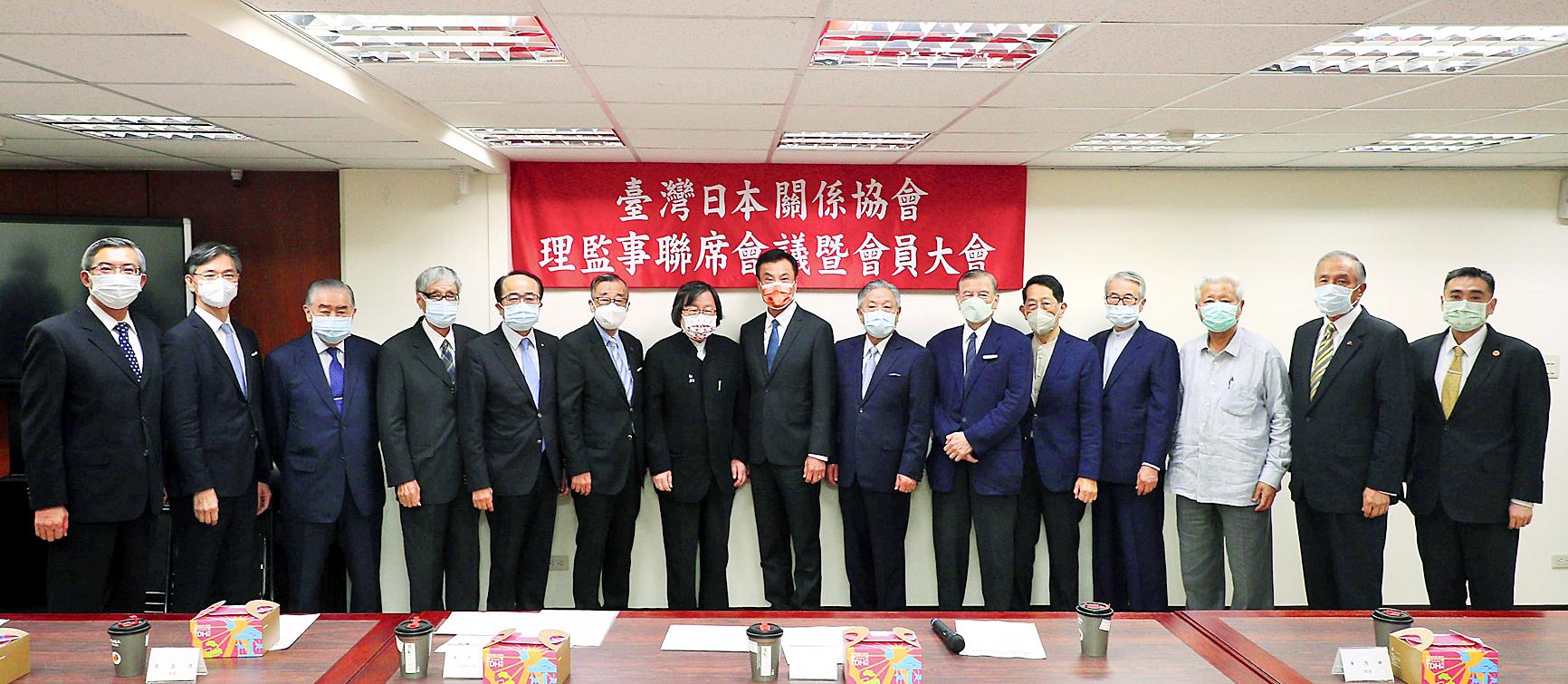The Taiwan-Japan Relations Association (TJRA) on Friday appointed former legislative speaker Su Jia-chyuan (蘇嘉全) as its chairman, the government-funded organization said.
The association’s directors and supervisors approved the resignation of former chairman Chiou I-jen (邱義仁) and confirmed Su as his replacement during a meeting on Friday morning, it said in a statement.
It is unclear why Chiou, 72, stepped down from the position he had held for six years. Local media have cited sources from the ruling Democratic Progressive Party (DPP) as saying that he resigned due to health concerns.

Photo courtesy of the Taiwan-Japan Relations Association via CNA
The association serves as a corresponding organization to the Japan-Taiwan Exchange Association, which represents Tokyo’s interests in Taipei in the absence of formal diplomatic relations.
In Friday’s meeting, Su pledged to make every effort to enhance Taiwan-Japan relations.
The 66-year-old said that during his tenure in the legislature, he was dedicated to promoting exchanges between Taiwanese and Japanese lawmakers.
He also led a legislative delegation to Japan to show that legislators across party lines cherished the nation’s ties with Japan, said Su, who was previously the Presidential Office secretary-general.
Japanese Representative to Taiwan Hiroyasu Izumi on Friday expressed online his gratitude for Chiou’s contributions to promoting the Taiwan-Japan ties.
Chiou was “an important bridge” between Tokyo and Taipei, and during his six years of service at the Taiwan-Japan Relations Association, bilateral tourism and trade reached record highs, wrote Izumi, who is also head of the Japan-Taiwan Exchange Association’s Taipei office.
Speaking to the Central News Agency on Friday, DPP Legislator Lo Chih-cheng (羅致政) lauded Su as an excellent replacement for Chiou because of his close rapport with President Tsai Ing-wen (蔡英文) due to their years of working together.
The selection of Su to head the Taiwan-Japan Relations Association is symbolic of the importance Taiwan attaches to its relationship with Japan, Lo said.
The association is expected to play an important role in facilitating trade and security cooperation between the two nations, especially as Taiwan seeks to join the Comprehensive and Progressive Agreement for Trans-Pacific Partnership, while Japan shows more concern for the peace and stability of the Taiwan Strait, Lo said.

The Ministry of Economic Affairs has fined Taobao NT$1.2 million (US$36,912) for advertisements that exceed its approved business scope, requiring the Chinese e-commerce platform to make corrections in the first half of this year or its license may be revoked. Lawmakers have called for stricter enforcement of Chinese e-commerce platforms and measures to prevent China from laundering its goods through Taiwan in response to US President Donald Trump’s heavy tariffs on China. The Legislative Yuan’s Finance Committee met today to discuss policies to prevent China from dumping goods in Taiwan, inviting government agencies to report. Democratic Progressive Party Legislator Kuo Kuo-wen (郭國文) said

The Ministry of Economic Affairs has fined Taobao NT$1.2 million (US$36,900) for advertisements that exceeded its approved business scope and ordered the Chinese e-commerce platform to make corrections in the first half of this year or its license would be revoked. Lawmakers have called for stricter supervision of Chinese e-commerce platforms and more stringent measures to prevent China from laundering its goods through Taiwan as US President Donald Trump’s administration cracks down on origin laundering. The legislature’s Finance Committee yesterday met to discuss policies to prevent China from dumping goods in Taiwan, inviting government agencies to report on the matter. Democratic Progressive Party

Taiwan and its Pacific ally Tuvalu on Tuesday signed two accords aimed at facilitating bilateral cooperation on labor affairs, according to Taiwan’s Ministry of Foreign Affairs (MOFA). The governments inked two agreements in Taipei, witnessed by Foreign Minister Lin Chia-lung (林佳龍) and visiting Deputy Tuvaluan Prime Minister Panapasi Nelesone, MOFA said in a news release. According to MOFA, the agreements will facilitate cooperation on labor issues and allow the two sides to mutually recognize seafarers’ certificates and related training. Taiwan would also continue to collaborate with Tuvalu across various fields to promote economic prosperity as well as the well-being of their

Sung Chien-liang (宋建樑), who led efforts to recall Democratic Progressive Party (DPP) Legislator Lee Kun-cheng (李坤城), was released on bail of NT$80,000 today amid outcry over his decision to wear a Nazi armband to questioning the night before. Sung arrived at the New Taipei District Prosecutors’ Office for questioning in a recall petition forgery case last night wearing a red armband bearing a swastika, carrying a copy of Adolf Hitler’s Mein Kampf and giving a Nazi salute. Sung left the building at 1:15am without the armband and covering the book with his coat. Lee said today that this is a serious